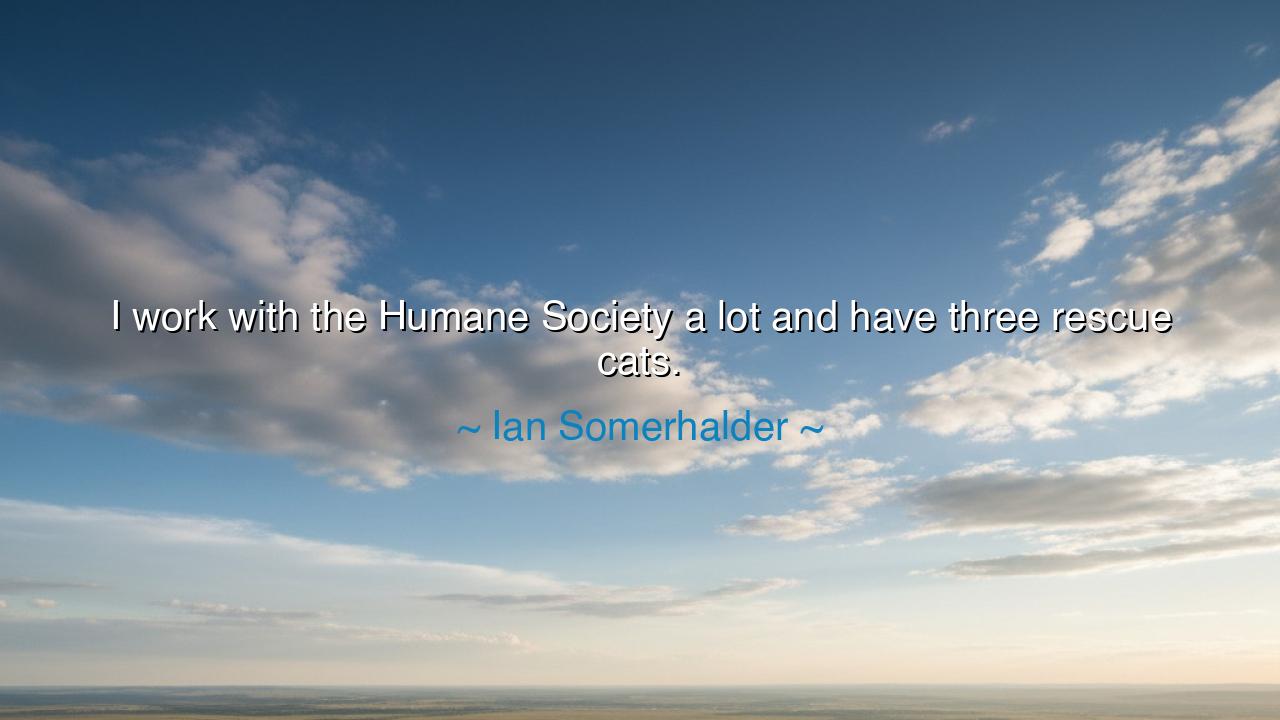
I work with the Humane Society a lot and have three rescue cats.






Hear now the tender words of Ian Somerhalder, spoken not of glory nor of riches, but of compassion: “I work with the Humane Society a lot and have three rescue cats.” Though simple in form, this saying holds a truth as noble as any carved upon the stones of history. For the measure of a soul is not found in what they command over others, but in how they care for the most vulnerable. In the act of rescue, in the choice to protect those without a voice, lies the essence of humanity itself.
In every age, the greatness of a people has been judged not by their armies or their treasures, but by how they treated the weak. Ancient kings who sheltered the orphan and the widow were remembered as just; empires that trampled upon the powerless withered in shame. So too in our time, the Humane Society and those who serve alongside it embody this eternal truth: that a society is purified by kindness, and ennobled by mercy toward creatures that cannot speak for themselves.
Consider the tale of Saint Francis of Assisi, who in the Middle Ages embraced not only the poor and the sick, but also the animals of field and sky. He called them his brothers and sisters, recognizing in their innocence the fingerprints of creation. Where others saw only beasts, he saw companions, deserving of care and reverence. His example stirred hearts then as it does now: that the truest strength is revealed in gentle stewardship. In Somerhalder’s devotion to his rescue cats, we hear that same echo of Francis, carried forward into our own age.
Yet there is more. To adopt the abandoned, the neglected, the broken—whether human or animal—is to stand against the tide of indifference. Many turn away, saying, “It is not my responsibility.” But those who rescue declare, “If not me, then who?” And in that decision lies heroism. For the world is healed not by grand speeches, but by small, repeated acts of compassion: the lifting of the lost, the feeding of the hungry, the comforting of the frightened. In each of these gestures, humanity redeems itself.
Bauman warned us of societies that measure worth by possessions. Somerhalder shows us another measure: by love freely given, not for gain but for the sake of life itself. In his work with the Humane Society, and in the keeping of his rescue cats, there is no wealth earned, no prestige sought—only the quiet triumph of goodness. It is a reminder that our greatness does not rest in how high we rise, but in how low we are willing to stoop to lift others.
What lesson, then, shall we take from this? It is simple yet profound: look around you and see the forgotten. Whether animal or human, they wait for hands of kindness. Choose to act. Support shelters, protect the voiceless, adopt rather than abandon, and carry compassion into all your dealings. For every creature saved is a life redeemed, and every act of mercy brings light into a darkened world.
And so, O seekers of wisdom, let Somerhalder’s words be etched in your hearts: to rescue is divine, to care is noble, to love is the highest calling. Do not wait for the world to change before you act; let your small actions change the world. For one rescued life is a universe of gratitude, and through many such acts, society itself is transformed into a place where mercy reigns, and every being, great or small, finds a home.






AAdministratorAdministrator
Welcome, honored guests. Please leave a comment, we will respond soon